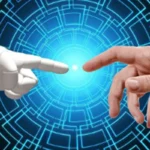Recent news speaks of next-generation CPUs that make computation much more energy efficient and compact, as well as much faster. These innovations are seemingly paving the way for servers, computers, laptops, tablets, and smartphones of the future to run very taxing artificial intelligence processes with relative ease.
At the same time, major manufacturers such as Nvidia and FOXcon have announced initiatives to create “AI factories.” These data centers will power the training models used in AI applications for robotics or self-driving cars. As a result, AI models will be trained much more quickly and with many more simulations and permutations, leading to significant advancements and improvements.
How the arrival of even faster, more efficient (and thus more powerful) AI will affect intellectual property creators and rights owners will, no doubt, be complicated and nuanced.
It could be a double-edged sword:
- On one hand, the accelerated pace of AI-driven innovation could lead to a surge in novel creations, thus expanding the scope of IP. Rapid advancements in AI might also result in quicker and more streamlined development processes.
- On the other, the speed and efficiency of AI could strain existing systems of copyright, ownership, enforcement, and what constitutes infringement. Policymakers and legal experts will need to adapt swiftly to ensure that IP laws are both robust and agile enough to keep pace with the effects of faster and more efficient AI.
Surely, certain aspects of faster, more efficient AI will do major good for the world, such as in the fields of medicine and science. At the same time, some aspects will be of great interest to individuals and businesses at work in the IP, technology, and cybersecurity space.
While not an exhaustive list, below are a few near-future, crystal ball impacts we might expect.
Major Disruptor
With more powerful AI, there’s the distinct possibility of major economic disruption due to AI replacing people and their jobs with more efficient processes. The impact of increased productivity, more efficient use of resources, and new technology will be felt globally.
To illustrate how a simple increase in technology could make such an impact, let’s imagine an autonomous food truck serving food via AI “personality robots.” Sound outlandish? The technology for this type of food truck already exists, but the cost of renting the server space and bandwidth necessary to keep the truck connected to the home office’s computing power is prohibitive.
Now imagine a fancy, high-speed, “near future internet” where our food truck operates through an offline chipset the size of a shoebox that’s stored onboard and uses less power than an iPhone. Suddenly, the concept becomes feasible.
Now imagine this happening with every business all over the planet in a relatively short time . . .
Robocall AI
Most of us know about those persistent phishing attempts conducted via phone or email. At present, they seem to be more irritating than they are threatening. But that could change as enhanced AI promises to make future phishing attempts far more convincing.
Robocall AI will research targets in depth, use the voices of family or friends, and even index intimate details of the person being called and known associates. Consider what happens once an average cell phone or tablet can do this.
According to a report by digital security company McAfee, 52% of Americans share their voices online in some manner. Apply the math to the USA’s 331.9 million residents and that’s around 172.6 million voices at the near-instant disposal of an AI trained on that dataset—all of which will become a major focus for both privacy and cybersecurity experts (if it it’s not already).
AI For President
We already see politicians using multi-lingual AI to make robocalls to constituents. Often these calls are made without the disclosure that they are AI-generated.
- What is the threshold for disclosure for deep-faked figures/video used in such robocalls? What about altered language, sounds of voices, or content?
- What potential is there for infringement and/or fraud, especially if the likeness or the voice of a famous person is used?
- Will a backpack-sized AI on the site of filming a campaign speech be able to track everyone dialing into the live feed, research their IP addresses, and edit and reproduce altered images, words, and language, in real time?
- Could your identity or IP be used in the creation of such content without your consent?
All the above and more is possible. That’s why individuals and businesses operating in the IP space more than ever should seek expert guidance and cutting-edge insight on AI’s current impacts on them and what might be coming next.
Let’s Work Together: Global Experience, Personal Focus
As experts in copyright matters, IP, and business litigation, artificial intelligence is a topic Ludwig APC is monitoring closely. Our goal is to keep clients advised on its impact on IP and business best practices.
If you have questions about how AI tools and products could affect your IP rights and business, contact us today to arrange a free consultation. Ludwig APC can be your guide as you integrate AI technologies while also protecting the IP you’ve worked so hard to build.
(619) 929-0873 | consultation@ludwigiplaw.com.



